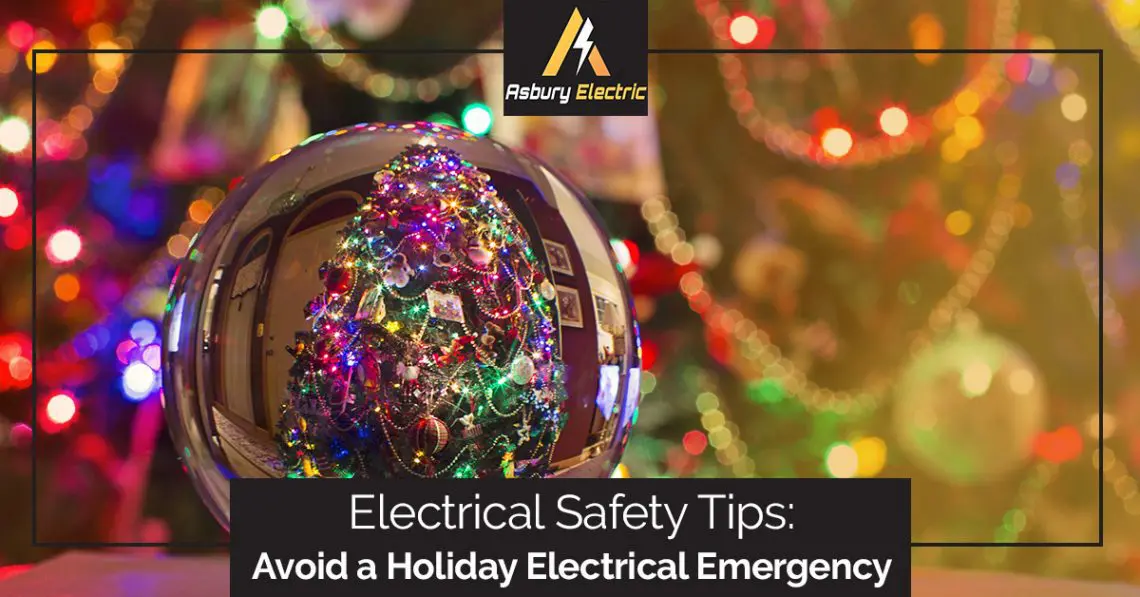Safety note- if you are experiencing an electrical emergency that involves smoking or sparking outlets or an electrical fire, get yourself and your family out of immediate danger and call 9-1-1. If it is safe to do so, turn off the power at the circuit breaker. Never use water to put out an electrical fire!
Appliances
Unplug unused appliances
Even when appliances are powered down, when they are plugged in, they still generate small amounts of energy. It is a good year-round practice to unplug unused appliances to help reduce home energy costs but is particularly useful during the holidays when the number of things being plugged in increases. This is not to suggest that between every microwave use that you unplug it, but if you have a television sitting in a guest room that hasn’t been turned on in months, unplug it!
Leave clearance around appliances
It is a good practice to always leave a few inches of clearance around appliances that generate heat such as televisions, computer monitors, and space heaters. During the holidays, you may need to pay more attention when there are more appliances being used and space seems to get smaller with more people and decorations to fill it.
Do not hang clothes on appliances
Never hang clothes or toys on appliances. It is a good idea to practice this, even on appliances that are unplugged and not in use, that way you won’t form bad habits and accidentally hang things on an active appliance. Hanging clothes on appliances reduce their ability to vent heat and can cause an electrical fire.
Keep appliances away from water
Always be sure to keep electrical appliances away from sinks and bathtubs, or any water source. This is a general rule that should always be followed. Electricity and water never mix. Water is an excellent carrier of electricity.
Lights
Turn off power before switching lights
Before switching out light bulbs, in lamps or strings of Christmas lights, it is important to prevent shocking yourself and the outlet, by first disconnecting the power. Typically, turning the light source off at the power switch is good enough, but if you want to be extra cautious, you can unplug the light source.
Use correct wattage
Always use the correct wattage light bulb. Do not simply trust the lightbulb you are switching out, read the wattage allowance on the appliance itself. At every bulb connection point, the appliance will list the upper and lower limit wattages. You may also consider using the most efficient light bulbs- which isn’t a safety tip but may save you a few dollars on your energy bill.
Screw bulbs in tightly
Always be sure to screw light bulbs in securely because loose bulbs can cause sparks. Be sure not to over screw bulbs, which can cause them to break in the socket or your hand.
Cords
Secure cords
Be sure not to have cords in areas that they may be tripped over or pulled on accidentally. Remember that electrical cords should never be used as rope, jump rope, or anything other than its intended use, whether plugged in or not. Tripping hazards should not be minimalized with rugs or otherwise and it may cover frays and still cause tugging at the power source.
Never staple or nail cords in place
Electrical cords should never be nailed or stapled in place. Not only can these things compromise the integrity of the wiring inside the cord casing, but staples and nails are metal, which can cause sparks or a fire. If a cord needs to remain in place, use tape or twist ties to secure them.
Never take off the third prong
The third prong on an electrical cord is the grounding prong. The purpose of this prong is to prevent static from creating sparks and igniting an electrical fire. If you have a socket that does not have three prongs, chances are it shouldn’t be used. If you do use it, never attempt to plug a three-pronged device into it. Never, ever, cut or file off the third prong. This is incredibly dangerous. If the third prong breaks off, do not use the device; replace it immediately.
Extension cord use should be minimized
The purpose of an extension cord is to provide extra length to a socket so that there is no unneeded tension on power cords. Extension cords should never lead to more extension cords or branch out to create additional plug-in space. When extension cords must be used outside, it is important to use an insulated outdoor extension cord. Most Christmas lights are relatively low wattage and act as their own extension cords, but nothing else should be plugged into the ports at either end of a string of lights.
Never pull on a cord to unplug it
Never tug on a power cord to unplug it from the outlet. When you need to unplug something, be sure to pull from the cord’s base. Pulling on a cord to unplug it may cause the cord to pull away from the prongs and fray over time. This can create an opportunity for electricity to escape and sparks to be created.
Outlets
Do not overload outlets
Many people are guilty of overloading power outlets by using multiple power strips or extension cords. A power outlet has space for two plugs because that is what the outlet can safely handle. If you do need additional power at the same outlet, be sure to use a safety power strip that will automatically turn off if the power is tripped.
Keep all outlets properly installed
Outlets should be secured in the wall with a plate covering the wiring. If, for some reason, the outlet is not secured, do not use it. In fact, power should be cut to the outlet at the circuit breaker.
All of these tips are good electrical safety sense that should be applied throughout the entire year. In times of increased energy use, these tips should be treated more as strict laws. Avoid spending your hard-earned gift spending money on an emergency electrician by following these tips. If you do find yourself experiencing an electrical emergency, call us at Asbury Electric Company and one of our 24-hour electricians will be on their way to you.



